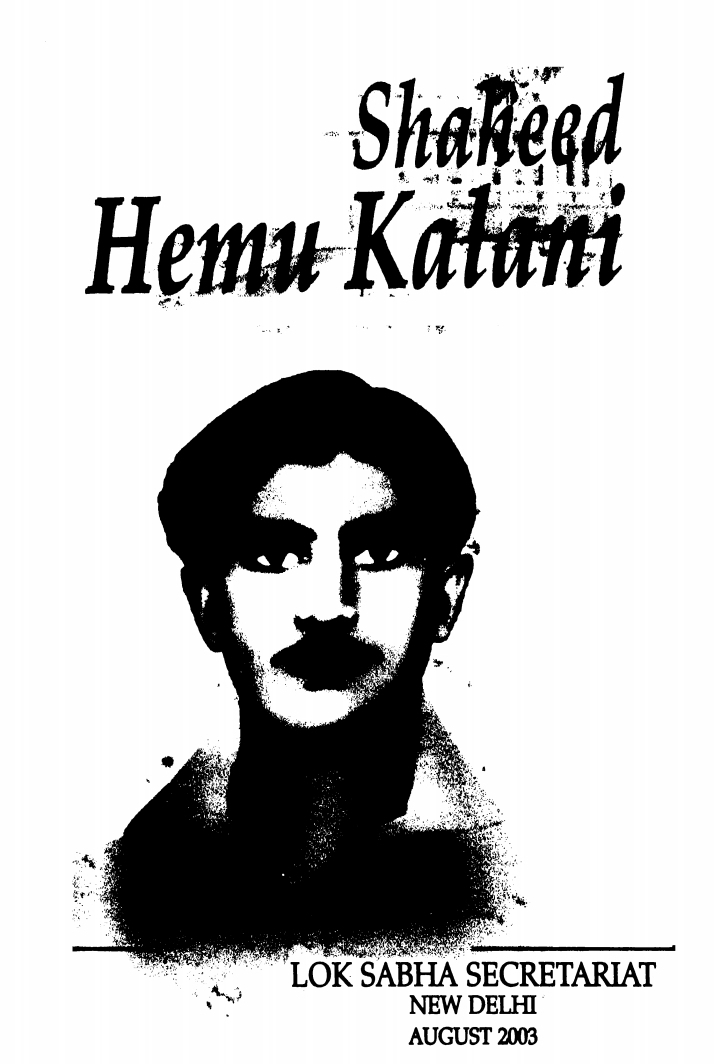
A 19-page brochure contains the excerpt from Nehru’s speech. The brochure was published by Indian Lok Sabha Secretariat on August 21, 2003 when the Prime Minister of India, Atal Bihari Vajpayee unveiled Shaheed Hemu’s 9ft statue in the Parliament House Complex.
By Nasir Aijaz
A few days after the martyrdom of Sindh’s young revolutionary leader Hemu Kalani, All India Congress Leader Pandit Jawaharlal Nehru while paying rich tributes to the martyr, had said, “This execution struck me as something which will have far-reaching consequences all over India, especially among the young. The blood of Hemu and others will long stand witness.”

Nehru had also visited Sindh in 1945 and paid homage to the martyr by calling on his mother at his residence, according to a 19-page brochure published by Indian Lok Sabha Secretariat, New Delhi in August 2003. The brochure contains Hemu’s profile and fourteen sketches depicting his life story.
Here is the excerpt from the brochure that contains a piece from Pandit Jawaharlal Nehru’s speech, which he made on 26 January, 1943, while addressing the thirteenth Independence Day Celebration. The Congress had started celebrating independence from 1930, and on 26 January 1930, the Indian National Congress under the Presidents hip of Jawaharlal Nehru had celebrated the First Independence Day.
Pandit Jawaharlal Nehru paid a rich tribute to Hemu Kalani in the following words:
“My mind travelled to Sindh where a few days ago a young boy, Hemu aged 20 was sent to the scaffold by a martial law court for the offence of tampering, or attempting to tamper, with railway lines. He was a college student, recently matriculated. Whether his offence was properly proved or not[1]little proof is needed by a military tribunal functioning under martial law-I do not know. But this execution struck me as something which will have far-reaching consequences all over India, especially among the young. The blood of Hemu and others will long stand witness …”
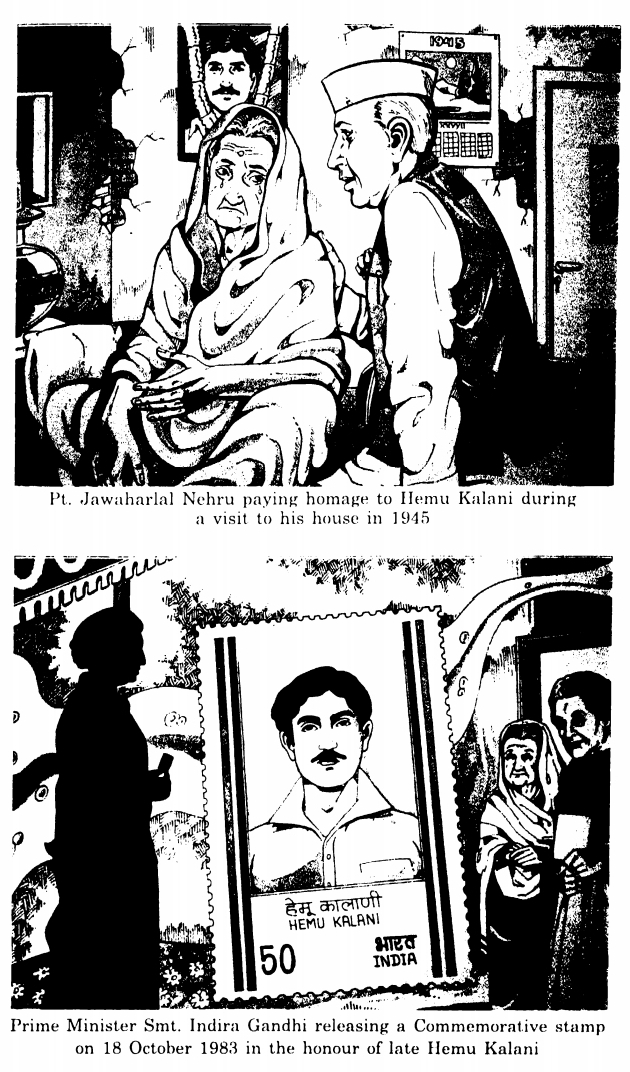 During his visit to Sindh in 1945 Pandit Jawaharlal Nehru paid homage to the martyr by calling on his mother at his residence.
During his visit to Sindh in 1945 Pandit Jawaharlal Nehru paid homage to the martyr by calling on his mother at his residence.
The senior officers of ‘Azad Hind Fauj’ of Netaji Subhash Bose also honored martyr Hemu by awarding gold medal to the members of his family.
The brochure further states that the Sindhis out of love and affection call Hemu Kalani as Bhagat Singh of Sindh.
Sadhu Vaswani also paid tribute in the following poetic words, according to brochure:
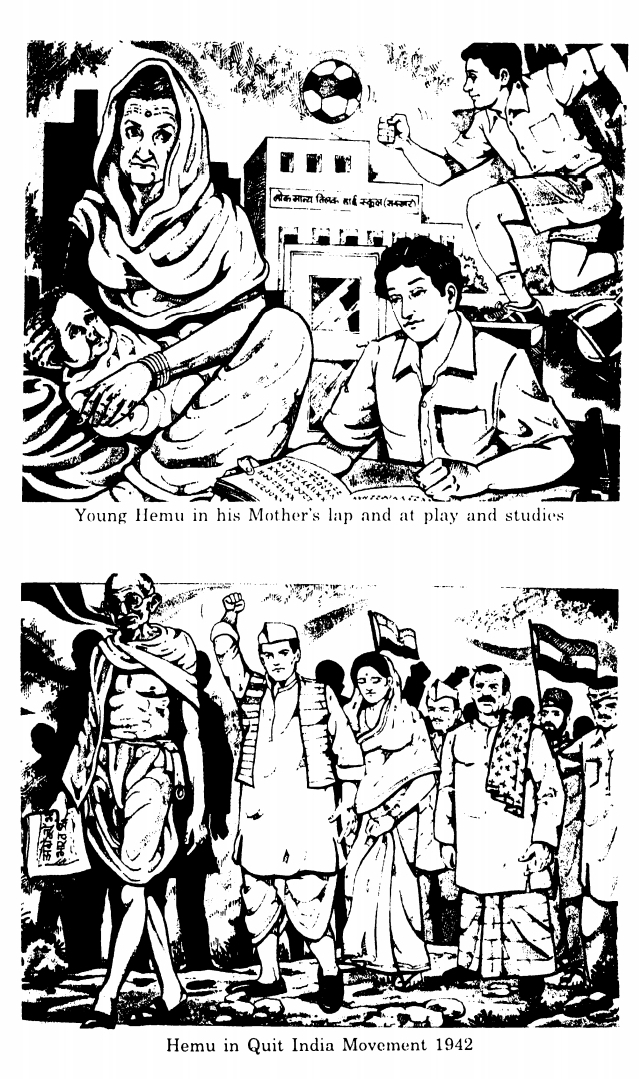 SADHU VASWANI ON MARTYR HEMU KALANI
SADHU VASWANI ON MARTYR HEMU KALANI
BELOVED HEMU! A true Hero were you, A Martyr among Martyrs!
Astonished I stand looking into your eyes,
Gentle with overflowing love for your country men!
May your memory remain enshrined in every heart forever and
Ever!
May we bow down to your heroic memory, in deep reverence!
Blowing bugles of victory, 0 Beloved of mine heart!
Broken and bleeding still is our Bharat, for our poor are still in
Shackles.
Bharat is not yet prosperous.
May you ever release again and again, the nation-building power!
That emerges from the blood of the martyrs, and through this,
May Bharat, the land of your youthful sacrifice
Ever grow fresh and strong and pure and free!
Commemorative Stamp in the honor of Hemu Kalani
The Government of India issued a postal stamp to commemorate Hemu’s martyrdom. It was released by the then Prime Minister, Smt. Indira Gandhi, on the 18th October 1983, at the Vishwa Sindhi Sammelan held at Delhi. A cassette record dedicated to the mother of the martyr Smt. Jethi Bai was also present on this occasion.
Preface of the Brochure
Mr. G. E. Malhotra, the then Secretary General of Lok Sabha, also paid rich tributes in the preface in following words:
Hemu Kalani, a great revolutionary of the twentieth century, is among the youngest martyrs of India’s Freedom Movement. At the tender age of nineteen years, he sacrificed his life for the sake of his motherland. In terms of courage, boldness and patriotism, his martyrdom is no less than that of any other martyr. The brave deeds of Hemu Kalani and his desire for walking into the footsteps of the martyrs is indeed unique.
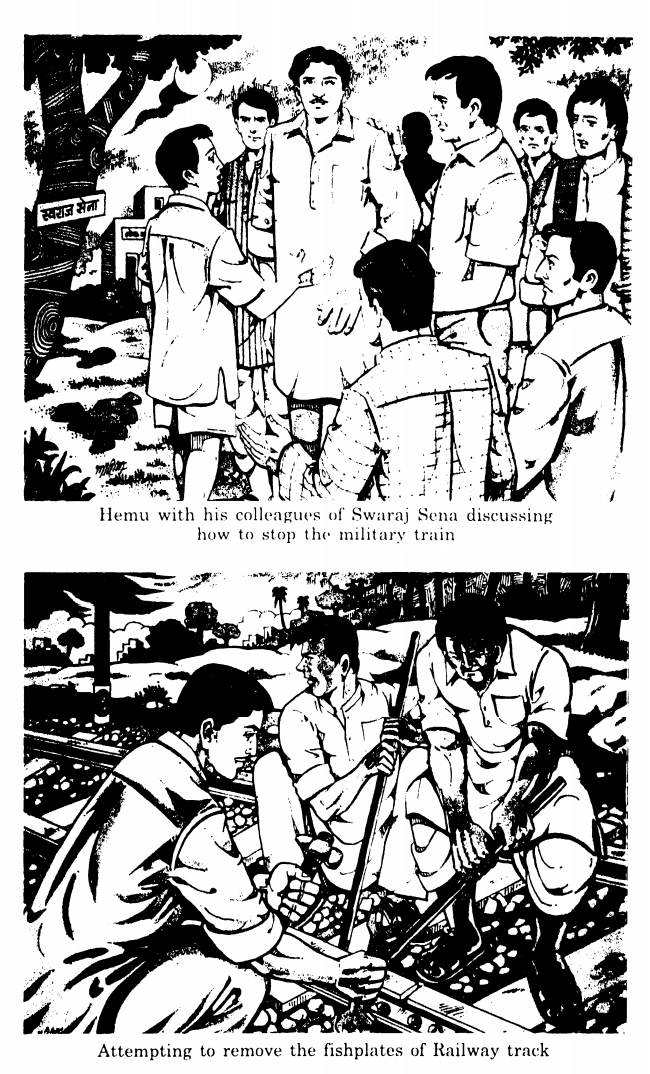 The grateful nation honors the martyrdom of Shaheed Hemu Kalani on 21 August, 2003 when the Prime Minister of India, Shri Atal Bihari Vajpayee unveils his statue in the Parliament House Complex. The initiative for installing the statue has come from General Purposes Committee of the Lok Sabha and the Sindhi Council of India.
The grateful nation honors the martyrdom of Shaheed Hemu Kalani on 21 August, 2003 when the Prime Minister of India, Shri Atal Bihari Vajpayee unveils his statue in the Parliament House Complex. The initiative for installing the statue has come from General Purposes Committee of the Lok Sabha and the Sindhi Council of India.
The statue of Hemu Kalani, sculptured by Ram V. Sutar is 9 feet in height. The statue has been donated by Shri Suresh A. Keshwani, former member of Rajya Sabha and the National President, Sind hi Council of India.
To mark the occasion, the Lok Sabha Secretariat is bringing out this brochure which contains a brief profile of Shaheed Hemu Kalani and a few available photographs of him. An exhibition on the life and times of Hemu Kalani is also being organized by the Parliament Museum and Archives of the Lok Sabha Secretariat.
We are grateful to the Speaker, Lok Sabha Shri Manohar Joshi who with his keen interest and valuable guidance has helped us in bringing out a booklet on Hemu Kalani and also in organizing the unveiling ceremony. We are also thankful to Shri Suresh A. Keshwani for donating the statue. This booklet is a humble tribute to the memory of Shaheed Hemu Kalani.
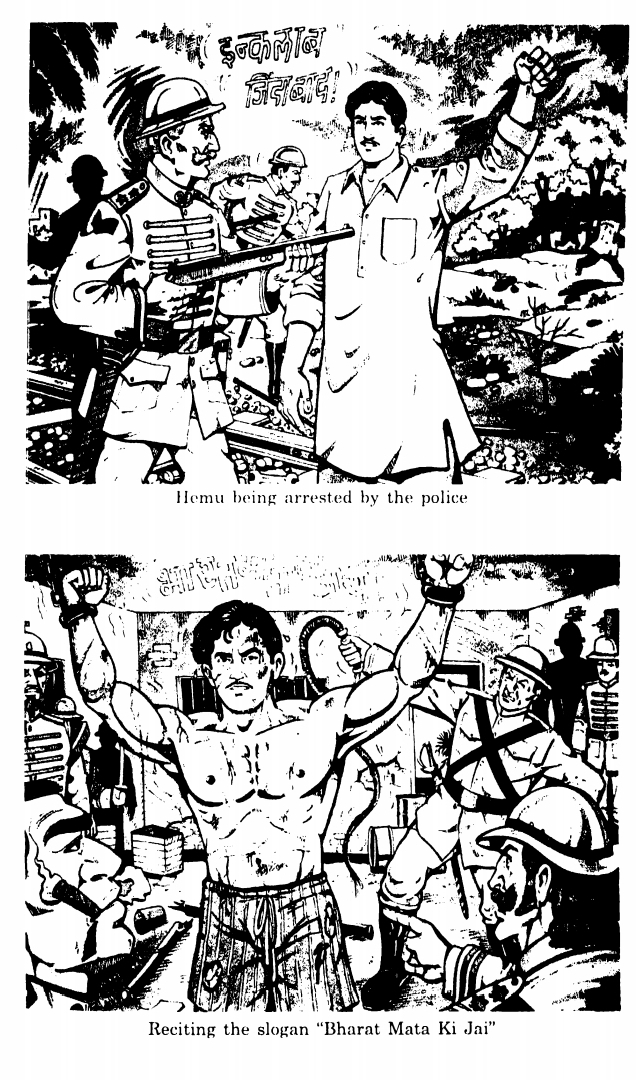 Profile of Shaheed Hemu Kalani
Profile of Shaheed Hemu Kalani
Hemu Kalani belongs to that rare band of revolutionaries and martyrs of the Indian freedom movement whose indomitable spirits broke new resistance and for whom tortures of imprisonment had no meaning and death sentence held no terror. At the tender age of nineteen years he was happy to make the supreme sacrifice for the liberation of his motherland. He was aptly described as ‘Abhimanyu’* of the Quit India Movement and one of the greatest martyrs of India. Hemu Kalani is a fine example of indomitable courage and an unflinching devotion to his motherland. He has also the rare distinction of being one of the youngest martyrs of India.
Early Years
Son of Jethi Bai and Pesumal Kalani, Hemu was born at Sukkur in Sindh (now in Pakistan) on 23 March, 1923. He belonged to a middle class Kalani family of Sindh. Hemu’s father Pesumal was a physician and Jethi Bai was a very religious and kind hearted housewife. Hemu was brave and patriotic right from his childhood.
Hemu completed his primary education at Sukkur and higher education at the famous Tilak High School-Sukkur. In 1942 he passed his matriculation examination.
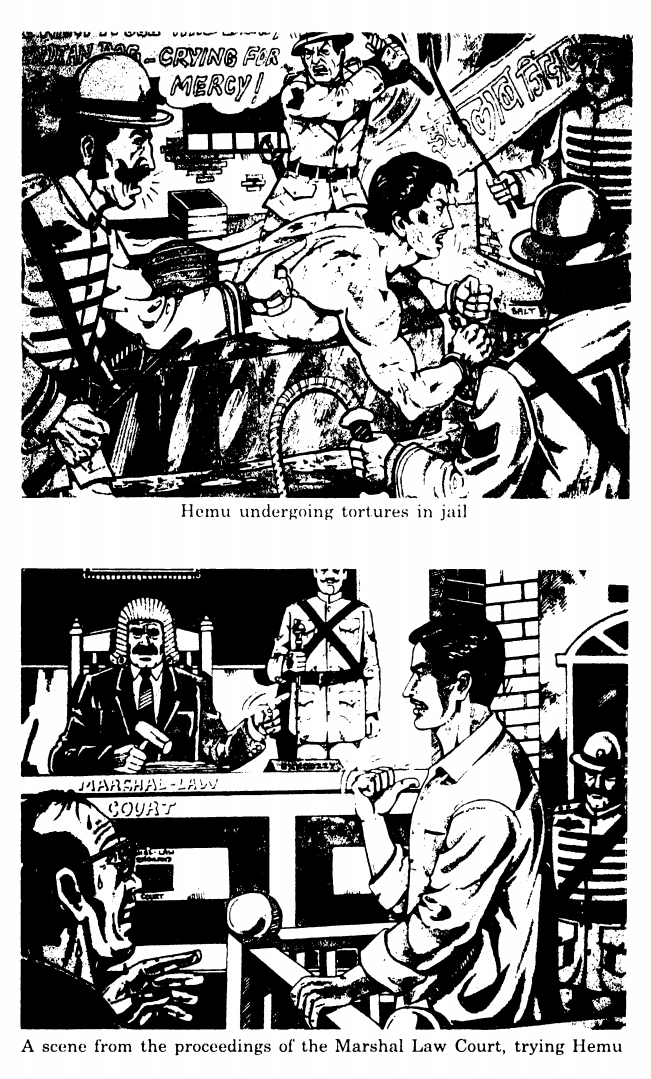 Spirit of Freedom Movement
Spirit of Freedom Movement
As a young boy, Hemu was influenced by the activities of his uncle, late Dr. Mangharam Kalani, who was a prominent Congress leader of Sukkur and a veteran freedom fighter. Inspired by his uncle’s example, he joined the Swaraj Sena (A Student Organization) and became its leader. He often used to lead the boys of his locality with the tri-color in his hands. Along with his friends, he used to plead for boycotting all foreign goods and to take an active part in persuading people to use Swadeshi goods.
He was soon drawn to revolutionary activities and started participating in political meetings, processions, ‘prabhat pheries’, picketing, shouting full-throated slogans of ‘Inquilab Zindabad’ and Bharat Mata Ki Jai.
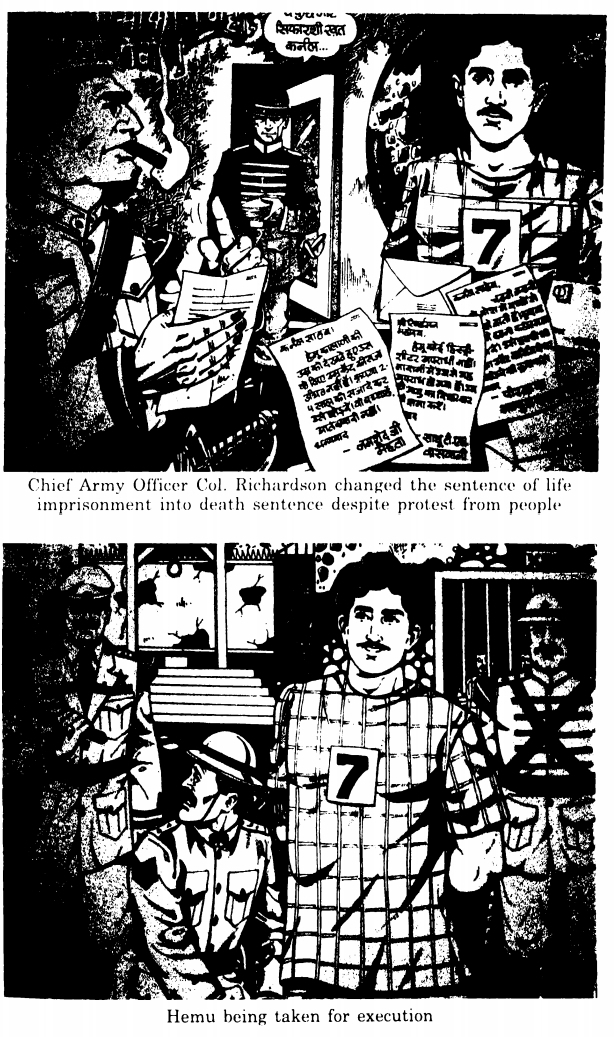 Quit India Movement
Quit India Movement
In 1942, when Father of the Nation, Mahatma Gandhi gave the clarion call of “Quit India” and the slogan “Do or die”, the atmosphere in the country became highly surcharged. Gandhiji’s call to the people was aimed at stirring the people that either we win our freedom or die working for it. The struggle between the people and the British Administration had intensified. Almost all the Congress leaders were arrested and imprisoned. In the absence of their leaders, students, workers, farmers, men and women, boys and girls, took the movement into their own hands and began attacking post offices, railway and police stations. The police tried to repress them through bullets and arrests. A strong, well built athlete, an expert cyclist and a prize winning swimmer, Hemu was deeply moved by the stirring events of those days, and he decided to play his role in the struggle. He had read the inspiring story of Sardar Bhagat Singh and of his martyrdom. Hemu Kalani also joined the mass movement. There was such active participation from the people of Sindh Province in this movement that the British rulers were compelled to send special troops consisting only of European.
Brave Deeds
In October 1942, Hemu Kalani came to know that British troops and ammunition would be arriving in Sindh by a train passing through his town. He decided to derail the train by removing the fishplates from the railway track. He and his friends were severely handicapped in not having any tools for loosening the nuts and bolts and for removing the fishplates. However, before they could complete the job, they were spotted by the British troops and Hemu, in his effort to save his friends, was caught.
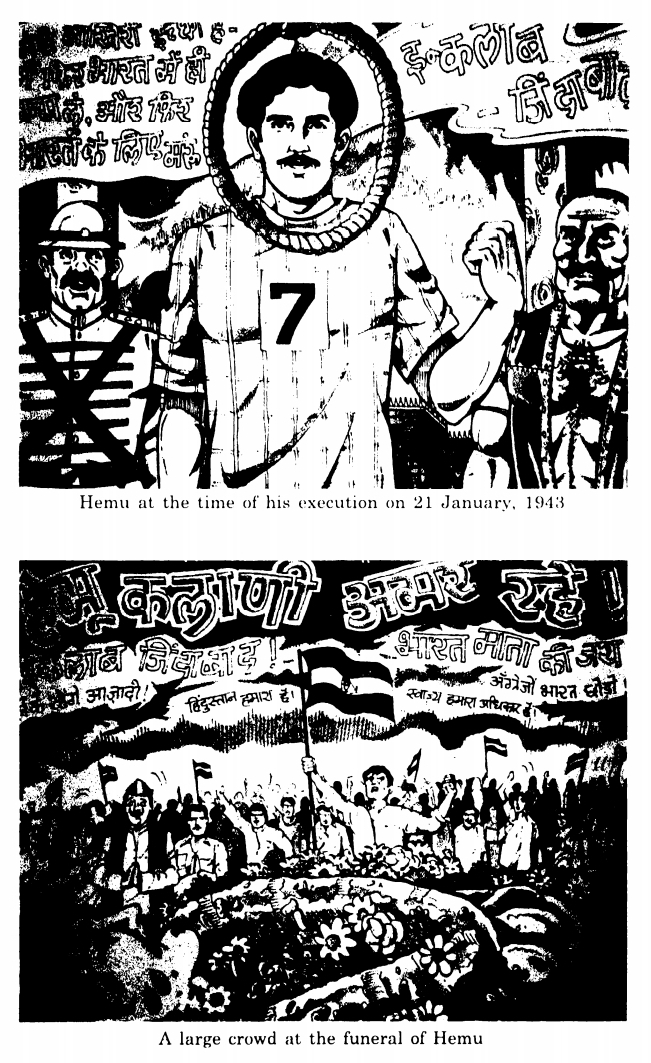 Walking in the Footsteps of Martyrs
Walking in the Footsteps of Martyrs
At that time martial law was enforced in Sindh due to Pir Pagaro’s ‘Hur Movement’. His case was referred to a Martial Law Court at Hyderabad, which after a prolonged trial, found him guilty of treason against the government and sentenced him to life imprisonment. He was tortured brutally by police to give out the names of his friends but he refused to do so he took the entire blame on himself. He told the police and the court that if it was right for the foreign rulers to crush the freedom struggle by resorting to arms and ammunition, he, on his part, was fully justified in attempting to destroy those very arms and ammunition.
The Martial Law Court of Sukkur forwarded its judgment of life imprisonment for the approval of Col. Richardson, the Chief Officer at the Head office at Hyderabad (Sindh). He was strongly against the revolutionaries and could not digest a young boy was challenging the British authority. With a strong feeling of revenge, he converted the life imprisonment of Hemu Kalani into death sentence.
The People of Sindh shocked at the verdict, petitioned for mercy to the Viceroy but the death sentence was to prevail unless Hemu turned an approver and gave information regarding his fellow revolutionaries. There was no question of Hemu accepting these conditions and he welcomed the impending death cheerfully.
This young freedom fighter and revolutionary was hung on 21 January 1943.
Protest over Death Sentence
The entire nation was shocked at such a harsh punishment for the one who was so young. While Hemu’s parents and his admirers moved heaven and earth to have his death sentence altered, Hemu himself was a picture of calm and composure, unruffled at the dreadful prospect of losing his life. He died with a smile on his face and the slogans “Inquilab Zindabad” and “Bharat Mata Ki Jai” on his lips.
The whole nation was sad about this severe sentence on a young man in his teens but the then rulers rejoiced. An appeal for mercy was preferred to the Martial Law Administrator Colonel Richardson by some of the most influential men of Sindh like Jamshedji Mehta, Sadhu T.L. Vaswani, Peerzada Abdul Sattar, Swami Hamandas and Veerumal Begraj. Unfortunately, this appeal was mercilessly turned down with the sentence changed to ‘Death by Hanging’ at Sukkur Jail.
___________________
Nasir Aijaz is a Karachi-based senior journalist and author of nine books and hundreds of articles on language, literature and history. He can be accessed at email: nasir.akhund1954@gmail.com
(Thanks to Mr. Vimal Shah, a friend based in Mumbai, who shared the copy of brochure)